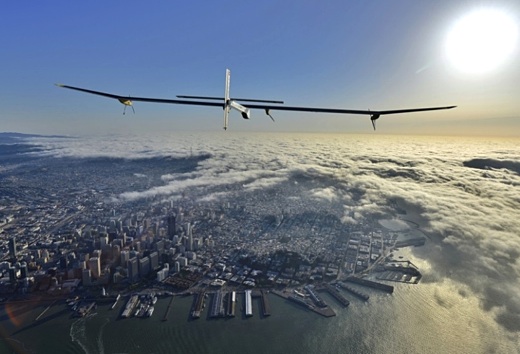SUBHEAD: Flying coast-to-coast has always been a mythical milestone full of challenges for aviation pioneers.
By John Upton on 8 July 2013 for Grist Magazine -
(http://grist.org/news/solar-plane-completes-cross-country-trip-despite-torn-wing/)

Image above: Solar impulse over American city. From (http://grist.org/slideshow/solar-impulses-u-s-adventures-in-photos/).
You know a plane is hot when wing damage actually hastens its arrival.
That happened Saturday night, when the solar-powered Solar Impulse completed a historic stop-and-start transcontinental voyage across America that began May 3 in San Francisco.
Between San Francisco and New York, the plane stopped over at Phoenix, Dallas-Fort Worth, St. Louis, Cincinnati, and Washington D.C., holding public events and meeting public officials.
“Flying coast-to-coast has always been a mythical milestone full of challenges for aviation pioneers,” Solar Impulse copilot and chairman Bertrand Piccard said. “During this journey, we had to find solutions for a lot of unforeseen situations, which obliged us to develop new skills and strategies. In doing so, we also pushed the boundaries of clean technologies and renewable energies to unprecedented levels.”
See also:
Ea O Ka Aina: Solar plane to cross America 5/23/13
And read more about the Solar Impulse: Solar plane crosses U.S., injects sexiness into the green conversation
.
By John Upton on 8 July 2013 for Grist Magazine -
(http://grist.org/news/solar-plane-completes-cross-country-trip-despite-torn-wing/)

Image above: Solar impulse over American city. From (http://grist.org/slideshow/solar-impulses-u-s-adventures-in-photos/).
You know a plane is hot when wing damage actually hastens its arrival.
That happened Saturday night, when the solar-powered Solar Impulse completed a historic stop-and-start transcontinental voyage across America that began May 3 in San Francisco.
- Total flying time: 105 hours and 41 minutes
- Distance flown: 3,511 miles
- Average speed: 33 miles per hour
- Gasoline consumed: 0 drops
The Solar Impulse, its four propellers driven by energy collected from 12,000 solar cells in its wings to charge batteries for night use, landed at John F. Kennedy Airport at 11:09 p.m. EDT, organizers said.The wing damage forced organizers to cancel a planned Statue of Liberty flyover, but it wasn’t enough to prevent them from achieving their dream of coast-to-coast solar-powered flight.
The experimental aircraft had left Dulles International Airport outside Washington for its last leg more than 18 hours earlier, on a route that took it north over Maryland, Delaware and New Jersey.
The spindly aircraft had been expected to land in the early hours of Sunday, but the project team decided to shorten the flight after an 8-foot (2.5 meter) tear appeared on the underside of the left wing.
Between San Francisco and New York, the plane stopped over at Phoenix, Dallas-Fort Worth, St. Louis, Cincinnati, and Washington D.C., holding public events and meeting public officials.
“Flying coast-to-coast has always been a mythical milestone full of challenges for aviation pioneers,” Solar Impulse copilot and chairman Bertrand Piccard said. “During this journey, we had to find solutions for a lot of unforeseen situations, which obliged us to develop new skills and strategies. In doing so, we also pushed the boundaries of clean technologies and renewable energies to unprecedented levels.”
See also:
Ea O Ka Aina: Solar plane to cross America 5/23/13
And read more about the Solar Impulse: Solar plane crosses U.S., injects sexiness into the green conversation
.
No comments :
Post a Comment